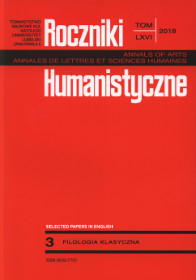The Concept of Brutishness (Thēriotēs) in Aristotle’s Nicomachean Ethics
The Concept of Brutishness (Thēriotēs) in Aristotle’s Nicomachean Ethics
Author(s): Maria Marcinkowska-RosółSubject(s): Language and Literature Studies, Philology
Published by: Towarzystwo Naukowe KUL & Katolicki Uniwersytet Lubelski Jana Pawła II
Keywords: brutishness / beastliness; vice; akrasia; moral psychology; Nicomachean Ethics; Aristotle
Summary/Abstract: The Polish version of the article was published in “Roczniki Humanistyczne,” vol. 64 (2016), issue 3.The article deals with “brutishness” or “beastliness” (thēriotēs), a concept introduced by Aristotle in the seventh book of the Nicomachean Ethics and defined by him as a negative ethical disposition, different both from vice (kakia) and from incontinence (akrasia), and leading to such pathological behaviours as cannibalism, paedophilia, omophagy, phobias and compulsions. Aristotle’s statements concerning brutishness (VII 1, 1145a15–35, VII 5, 1148b15–1149a24 and VII 6, 1149b23–1150a8) are examined and interpreted in order to clarify the following issues: the essence of thēriotēs as a specific ethical disposition (Sections I–II), its concrete forms and their causes (Section III), the moral-psychological condition of persons with a brutish hexis (Section IV), and their self-consciousness and moral responsibility for their brutish acts (Section V).
Journal: Roczniki Humanistyczne
- Issue Year: 66/2018
- Issue No: 3SP
- Page Range: 81-117
- Page Count: 37
- Language: English

